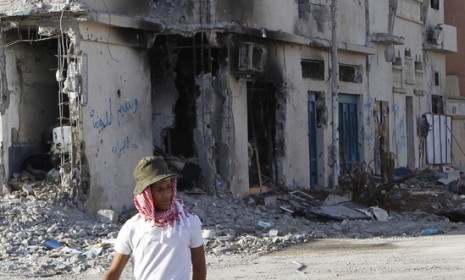Should NATO stay longer in Libya?
The U.N. prepares to scrap NATO's no-fly zone, and Libya's interim leaders worry that their fragile peace might unravel

A free daily email with the biggest news stories of the day – and the best features from TheWeek.com
You are now subscribed
Your newsletter sign-up was successful
The United Nations Security Council on Thursday passed a resolution dissolving NATO's mandate to intervene in Libya as of Oct. 31. The lifting of the no-fly zone implemented in March came despite pleas from Libya's interim leader, Mustafa Abdel-Jalil, to keep a NATO presence through the end of the year to protect civilians and the new government from attacks by the late Moammar Gadhafi's loyalists. Is it a mistake for NATO to leave so soon?
It's about time NATO stopped meddling: Libya needs NATO out of its affairs, John Rees of the Stop the War Coalition tells RT.com. The fact that the country's new leaders still want foreign military help only shows that they're "wholly dependent militarily, economically, politically on the West." A government like that "won't be in the interests of most Libyan people" — they need leaders who answer to them, not NATO.
"NATO actions not in Libyan people's interest"
The Week
Escape your echo chamber. Get the facts behind the news, plus analysis from multiple perspectives.

Sign up for The Week's Free Newsletters
From our morning news briefing to a weekly Good News Newsletter, get the best of The Week delivered directly to your inbox.
From our morning news briefing to a weekly Good News Newsletter, get the best of The Week delivered directly to your inbox.
The West can't afford to leave just yet: There's good reason to worry that "a quick pullout will trigger an escalation in violence," says John Little at Blogs of War. So regardless of what the U.N.'s diplomats say, Libya needs whatever "critical backup" it can get, whether it's open or covert. "It's all about sending the message to anyone, from Gadhafi loyalists to radical Islamists, that violence directed at the new government could trigger an alliance response."
Libya, not NATO, controls what happens next: "The defeat of the dictator is not enough for successful democratic transition," says Omar Ashour at Foreign Policy. Libya will need a measure of Western help to craft a constitution, hold elections, and become a free and fair society. But in the end, it's up to Libyans to set aside their differences and put down their guns, because that's what will determine whether their country becomes another Dubai, or another Somalia.
A free daily email with the biggest news stories of the day – and the best features from TheWeek.com